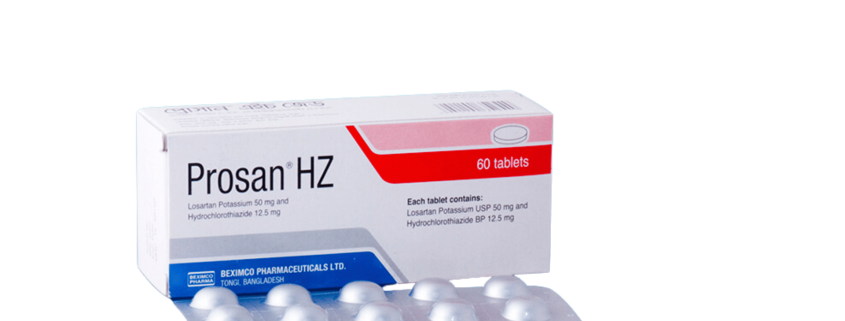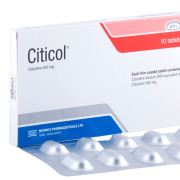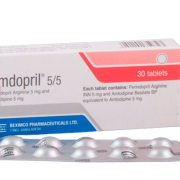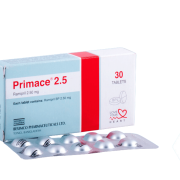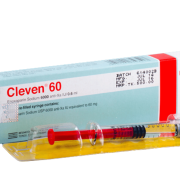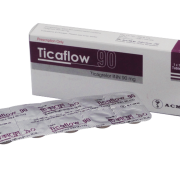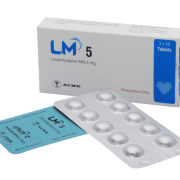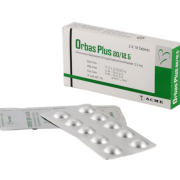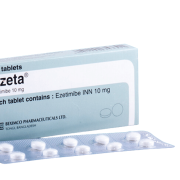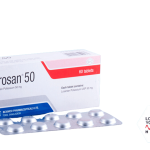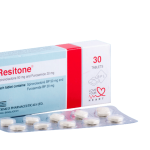Prosan HZ
Generic Name: Losartan Potassium Hydrochlorothiazide
Dosage Form: Tablet
TG Name: Cardiovascular
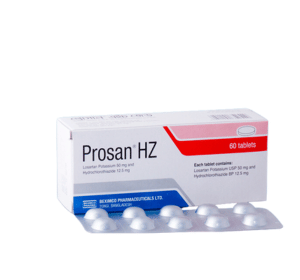
1. What Prosan® HZ is and what it is used for?
Prosan® HZ is a combination product of Losartan Potassium and Hydrochlorothiazide. Angiotensin II is a potent vasoconstrictor, the primary vasoactive hormone of the renin-angiotensin system and an important component in the pathophysiology of hypertension. It also stimulates aldosterone secretion by the adrenal cortex. Losartan and its principal active metabolite block the vasoconstrictor and aldosterone-secreting effects of angiotensin II by selectively blocking the binding of angiotensin II to the AT1 receptor found in many tissues, (e.g. vascular smooth muscle, adrenal gland). Hydrochlorothiazide is a thiazide diuretic.
Thiazides affect the renal tubular mechanisms of electrolyte reabsorption, directly increasing excretion of sodium and chloride in approximately equivalent amounts. Indirectly, the diuretic action of Hydrochlorothiazide reduces plasma volume, with consequent increases in plasma renin activity, increases in aldosterone secretion, increases in urinary potassium loss, and decreases in serum potassium. The renin-aldosterone link is mediated by angiotensin II, so coadministration of an angiotensin II receptor antagonist tends to reverse the potassium loss associated with these diuretics. Prosan® HZ is indicated for the treatment of hypertension. This fixed dose combination is not indicated for initial therapy of hypertension, except when the hypertension is severe enough that the value of achieving prompt blood pressure control exceeds the risk of initiating combination therapy in these patients.
2. Before you take Prosan® HZ
Precautions
Periodic determination of serum electrolytes to detect possible electrolyte imbalance should be performed at appropriate intervals. All patients receiving thiazide therapy should be observed for clinical signs of fluid or electrolyte imbalance: hyponatremia, hypochloremic alkalosis, and hypokalemia. Because losartan decreases uric acid, Losartan in combination with Hydrochlorothiazide attenuates the diuretic-induced hyperuricemia. In diabetic patients dosage adjustments of insulin or oral hypoglycemic agents may be required. Hyperglycemia may occur with thiazide diuretics. The antihypertensive effects of the drug may be enhanced in the postsympathectomy patient. If progressive renal impairment becomes evident, consider withholding or discontinuing diuretic therapy. Thiazides have been shown to increase the urinary excretion of magnesium; this may result in hypomagnesemia. Thiazides may decrease urinary calcium excretion. Increases in cholesterol and triglyceride levels may be associated with thiazide diuretic therapy. Safety and effectiveness in pediatric patients have not been established.
Contraindication
Prosan® HZ is contraindicated in patients who are hypersensitive to any component of this product. Because of the Hydrochlorothiazide component, this product is contraindicated in patients with anuria or hypersensitivity to other sulfonamide-derived drugs.
Use in Patients with Renal Impairment: The usual regimens of therapy with Prosan® HZ may be followed as long as the patient’s creatinine clearance is >30 mL/min. In patients with more severe renal impairment, loop diuretics are preferred to thiazides, so Prosan® HZ is not recommended.
Patients with Hepatic Impairment: Prosan® HZ is not recommended for titration in patients with hepatic impairment because the appropriate 25 mg starting dose of losartan cannot be given.
3. How to take Prosan® HZ?
Dosing must be individualized. The usual starting dose of Losartan is 50 mg once daily, with 25 mg recommended for patients with intravascular volume depletion (e.g. patients treated with diuretics) and patients with a history of hepatic impairment. Losartan can be administered once or twice daily at total daily doses of 25 to 100 mg. If the antihypertensive effect measured at trough using once-a-day dosing is inadequate, a twice-a-day regimen at the same total daily dose or an increase in dose may give a more satisfactory response. Hydrochlorothiazide is effective in doses of 12.5 to 50 mg once daily and can be given at doses of 12.5 to 25 mg as Prosan® HZ. To minimize dose-independent side effects, it is usually appropriate to begin combination therapy only after a patient has failed to achieve the desired effect with monotherapy.
4. Possible side effects
In clinical trials with Losartan Potassium and Hydrochlorothiazide, no adverse experiences peculiar to this combination have been observed. Adverse experiences have been limited to those that were reported previously with Losartan Potassium and/or Hydrochlorothiazide. The overall incidence of adverse experiences reported with the combination was comparable to placebo.
5. How to store Prosan® HZ?
Tablets should be stored below 25° C and protected from light and moisture.

